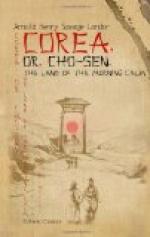One great feature of Cho-sen life are the children. One might almost say that in Cho-sen you very seldom see a boy, for boyhood is done away with, and from childhood you spring at once to the sedate existence of a married man. Astonishing as this may sound, it is nevertheless true. The free life of a child comes to an end generally when he is about eight or nine years of age. At ten he is a married man, but only, as we shall see later, nominally. For the present, however, we shall limit ourselves to a consideration of his bachelor days.
[Illustration: COREAN MARRIED MAN, AGE 12]
It must be known that in Corea, just as here, boys are much more cherished than girls, and the elder of the boys is more cherished than his younger brothers, should there be more than one in a family, notwithstanding that the younger are better-looking, cleverer and more studious. When the father dies, the eldest son assumes the reins of the family, and his brothers look to him as they had before done to their father. He it is who inherits the family property and nearly all the money, though it is an understood rule that he is bound either to divide the inheritance share and share alike with the rest of the family, or else keep them as the father had done. Thus it is that Corean families are, for the most part kept together; one might almost say that the kingdom is divided into so many clans, each family with the various relations making, so to speak, one of them. Family ties are much regarded in the Land of the Morning Calm, and great interest is taken by the distant relations in anything concerning the happiness and welfare of the family. What is more, if any member of the clan should find himself in pecuniary troubles, all the relations are expected to help him out of them, and what is even more marvellous still, they willingly do it, without a word of protest. The Corean is hospitable by nature, but with relations, of course, things go much further. The house belonging to one practically belongs to the other, and therefore it is not an uncommon occurrence for a “dear relation” to come to pay a visit of a few years’ duration to some other relation who happens to be better off, without this latter, however vexed he may be at the expense and trouble caused by the prolonged stay of his visitor, even daring to politely expel him from his house; were he to do so, he would commit a breach of the strict rules of hospitality enjoined by Corean etiquette. Even perfect strangers occasionally go to settle in houses of rich people, where for months they are accommodated and fed until it should please them to remove their quarters to the house of some other rich man where better food and better accommodation might be expected. There is nothing that a Corean fears so much as that people should speak ill of him, and especially this is the bugbear under which the nobleman of Cho-sen is constantly labouring, and upon which these black-mailers and “spongers”




